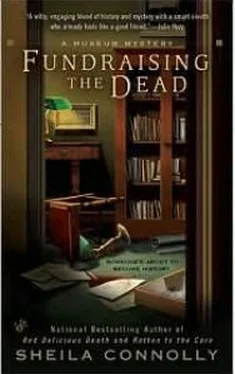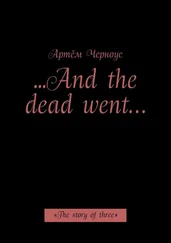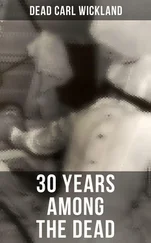Sheila Connolly - Fundraising The Dead
Здесь есть возможность читать онлайн «Sheila Connolly - Fundraising The Dead» весь текст электронной книги совершенно бесплатно (целиком полную версию без сокращений). В некоторых случаях можно слушать аудио, скачать через торрент в формате fb2 и присутствует краткое содержание. Жанр: Детектив, на английском языке. Описание произведения, (предисловие) а так же отзывы посетителей доступны на портале библиотеки ЛибКат.
- Название:Fundraising The Dead
- Автор:
- Жанр:
- Год:неизвестен
- ISBN:нет данных
- Рейтинг книги:4 / 5. Голосов: 1
-
Избранное:Добавить в избранное
- Отзывы:
-
Ваша оценка:
- 80
- 1
- 2
- 3
- 4
- 5
Fundraising The Dead: краткое содержание, описание и аннотация
Предлагаем к чтению аннотацию, описание, краткое содержание или предисловие (зависит от того, что написал сам автор книги «Fundraising The Dead»). Если вы не нашли необходимую информацию о книге — напишите в комментариях, мы постараемся отыскать её.
Fundraising The Dead — читать онлайн бесплатно полную книгу (весь текст) целиком
Ниже представлен текст книги, разбитый по страницам. Система сохранения места последней прочитанной страницы, позволяет с удобством читать онлайн бесплатно книгу «Fundraising The Dead», без необходимости каждый раз заново искать на чём Вы остановились. Поставьте закладку, и сможете в любой момент перейти на страницу, на которой закончили чтение.
Интервал:
Закладка:
“I completely understand, Alfred-I do the same thing myself sometimes. Go on,” I urged.
He gave me a wavery smile, but it faded quickly. “Well, recently, I’ve found that a number of items aren’t where they’re supposed to be. At first I thought, oh, they’re just misfiled, moved to a different shelf. Or someone had decided that they were important or valuable and had moved them to a safer place, without making a note in the record. That certainly does happen, even in the best-run places. When you’ve got a century’s worth of sloppy cataloging, of course some things have slipped through the cracks.” Maybe he was trying to convince himself, but Alfred didn’t look very certain.
“And you were beginning to get worried?” I prodded gently.
“I was afraid that I’d messed up something or that there was a bug in Cassandra. So I started double-checking. And I couldn’t find a number of these things, even in unlikely places. They’re just not in the building.”
Alfred and I stared at each other for several seconds. Then I said carefully, “What kind of things are we talking about?”
He considered. “Books, prints, letters, and some artifacts. Not just one group. Not just one period, either. But they all share something: they’re what you might call valuable to a collector or on the open market.”
“You mean worth a lot of money?” Alfred put monetary value far down the list of criteria when evaluating the worth of a historical item, but others might not feel the same way.
“Well, for example, I was at an auction at Freeman’s last year, where there was a Jefferson autograph letter that sold for twenty thousand dollars. Just out of curiosity, I checked our records after the auction, since I knew that we should have had one a lot like it. But that was one of the things I couldn’t find.” He lapsed into a glum silence.
My mind was churning furiously, turning over alternatives. Finally, I said carefully, “Alfred, let me ask you this: do you think this is the result of long-term carelessness-no, I don’t mean you-or are you saying that you think that these things have been deliberately removed from the Society?”
He looked positively miserable. “I don’t know. At first, as I said, I thought it could be human error or just bad record-keeping. But as more and more things turned up missing, and I looked at them as a group, I realized that they were important items-the type of things that someone would be likely to take for gain or for the sake of owning them. They’re definitely desirable. So, to answer your question”-he took a deep breath-“yes, I’m afraid someone has been stealing from the Society.”
We both sat back in our seats. I was stunned, though of course there were a million things I wanted to ask. I decided to start cautiously. “Alfred, have you discussed this with anyone else?”
He looked at me with a mixture of guilt and trepidation. “No. At first I didn’t want to believe it. And then when I did, I was afraid someone would blame me. I’ve been trying to avoid thinking about it at all.”
“All right, Alfred. Let’s step back a moment. Walk me through the process. When you think something is missing, you do a very thorough search first.” When he nodded, I went on. “And when you don’t find it and decide it is officially missing, what do you do?”
“I fill out a missing-item form and put it in the file. Oh, and in Cassandra, now.”
I gazed at him with no little incredulity. “And that’s all? You don’t report it to anyone else?”
“Like who?” He eyed me curiously.
“Latoya, to begin with.” The vice president of collections was his immediate supervisor. “Or the president, or the board. Or the police.”
Alfred looked horrified. “The police? Why would I tell the police?”
“Because it could be theft, Alfred, and that’s a crime. But let’s take this one step at a time. Do you report missing items to Latoya?”
He gulped. “Yes. I give her a monthly status report that lists items processed in the month and includes items not found.”
I reflected on that. “So, in an average month, what do those numbers look like?”
“Oh, a few thousand input, in a good month-and usually there are maybe ten or twenty that turn up missing. But that could just mean I can’t find them, not that they’re really gone.”
“I understand. But it’s safe to say that the percentage of missing items is very small, right? And that the numbers here fall within the normal range for a place like this?” He nodded. “Do you identify the missing items?”
“Sometimes-it depends on what they are.”
I knew that Latoya would report those results, in condensed form, to the president at monthly staff meetings, and then they would be passed on to the board at their quarterly meetings. But both the lack of detail and the repetition each month would dull the impact-it was just another piece of standard information to be checked off a list at the meeting. In addition, board members were seldom museum professionals, so if the Society’s leaders told them not to worry, they wouldn’t.
“All right. Is there any way for you to determine how long these things have been missing? Even very broadly-say a century versus a year?”
He shook his head. “No, not really. It depends on when the item was originally cataloged, or if it’s been accessed since. In some cases, the more notable things have been used by scholars in publications, or they’ve been loaned for an exhibition somewhere else. We’re always careful to keep close records of cases like that, and keep copies in the file. You know, for copyright issues or insurance questions. But those would be pretty much the only instances when there would be intermediate evidence of where something is, between its first entry and now.”
Items flowed into the Society, had been flowing in for more than a century; they were assigned a number, and then wandered around the building-or, quite possibly, out of the building. Any number of people could have laid hands on these things, both staff and outsiders such as researchers and board members. Any number of these people could have slipped a rare and valuable item into a pocket or bag and just walked out the door. And we had little or no way of knowing who, what, or when.
Damn-I did not need to hear this now, with the gala less than three hours away. I was definitely getting a headache.
Alfred’s voice interrupted the spinning in my head. “Nell? Why are you asking this now?”
I glanced at the clock behind Alfred’s desk and cut to the chase. “Marty Terwilliger came to me today and wanted to know where the letters between Major Jonathan and George Washington from the Terwilliger Collection were. She’d seen them recently, so she knew they were there. But apparently they aren’t now. So I said I’d look into it.” And I was beginning to regret that I had. I should have just dumped this into someone else’s lap and run screaming. But now I knew about it, and what was worse, I was beginning to understand how much could go wrong with our system. But what was I supposed to do about it? Alfred was still looking at me nervously.
I sighed. “Alfred, can you give me a list of all the things you think are missing? And any other information that goes with them?” From what he’d said, it could be quite a few items, but I wanted to see them all together before I made any assumptions-or any decisions about what to do, like what to tell Marty. “It would be a big help to me.”
He nodded. “Sure, no problem. When do you need it?”
“Tomorrow’s fine. You weren’t planning to go to the gala, were you?”
Alfred shook his head vehemently. “No way-too much noise and fuss. Not my kind of thing. But I can stay late and run out the report for you, so you’ll have it when you come in tomorrow. That okay?”
Читать дальшеИнтервал:
Закладка:
Похожие книги на «Fundraising The Dead»
Представляем Вашему вниманию похожие книги на «Fundraising The Dead» списком для выбора. Мы отобрали схожую по названию и смыслу литературу в надежде предоставить читателям больше вариантов отыскать новые, интересные, ещё непрочитанные произведения.
Обсуждение, отзывы о книге «Fundraising The Dead» и просто собственные мнения читателей. Оставьте ваши комментарии, напишите, что Вы думаете о произведении, его смысле или главных героях. Укажите что конкретно понравилось, а что нет, и почему Вы так считаете.












